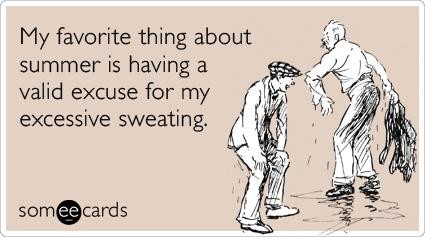By Manzanillo Sun Writer from the February 2013 Edition
In my opinion, if you think you’ve acclimated to the heat in Manzanillo it would likely be more psychological than physical. And also, we all learn to go with the flow (pardon the pun), dress more selectively, forego fashion, choose absorbent materials, find shady spots to sit in, relax by the pool or the beach, stay hydrated and worship the breezes.
People keep saying ‘you’ll get used to it over time’ which is absolutely true. But you won’t necessarily be perspiring any less. The fact of the matter is that the body was designed for perspiration and that is our cooling system so to speak. Now there are some marginal differences among us humans which I’ll share with you a little later. But for now, if you’re perspiring a lot, your body is working very efficiently.
As a true confession, I must admit my ignorance. My excuse is that I am a born and raised Canadian girl from the western prairies. Sure, we have nice summers but to compare 30+ degrees daily, high humidity and the rainy seasons is my folly. And also to think that some physical metamorphosis occurs with the extension of time lived in Mexico is also folly.
 What we learn to do is live differently. Some people will use a lot more air-conditioning in their homes and cars and simply stay out of the sun. But there are others like myself who don’t have a car as yet and air conditioning is provided only in the bedrooms, though ceiling fans are in constant motion. Luckily, we have a pool and the ocean at our doorstep so dips in the water and cooling breezes really are a source of sheer joy. And if you ask me if I’d prefer the cold winters that I grew up with the answer is most definitely not. (Although in my younger days, I skied the Rockies and skated on lakes which I loved).
What we learn to do is live differently. Some people will use a lot more air-conditioning in their homes and cars and simply stay out of the sun. But there are others like myself who don’t have a car as yet and air conditioning is provided only in the bedrooms, though ceiling fans are in constant motion. Luckily, we have a pool and the ocean at our doorstep so dips in the water and cooling breezes really are a source of sheer joy. And if you ask me if I’d prefer the cold winters that I grew up with the answer is most definitely not. (Although in my younger days, I skied the Rockies and skated on lakes which I loved).
So if you find yourself sweating profusely and cursing your deodorants lack of protection. Forget about it! It can’t possibly do the job. Here is why:
Human beings have sweat glands distributed over much of the body. Not just the armpits. So if you notice perspiring down the neck, scalp, chest, back, abdomen, legs and so on, you’d pretty much have to cover yourself in deodorant and I’m pretty sure it couldn’t hold the dam back anyway, nor would it be a good thing.
Sweating is primarily a means of thermoregulation which is achieved by the water-rich secretion of the eccrine glands. And would you believe that the maximum sweat rates of an adult can be up to 2-4 liters per hour or 10-14 liters per day!
Men and women have roughly the same number of sweat glands, with a whopping estimate of about 2-5 million over the whole body, or about 150-350 per square centimeter. When the temperature rises, these glands ooze out onto the skin a liquid that is 99% water, the remaining 1% being sodium chloride, other salts, amino acids and a smattering of other chemicals.
Evaporation of sweat from the skin surface has a cooling effect due to the latent heat of evaporation of water. So, in hot weather, or when our muscles heat up due to exertion, more sweat is produced. Men, on average, start perspiring much more quickly than women (you could have fooled me), then twice as much when they are in the middle of exercising at the same relative intensity. However, when men and women exercise at the same absolute intensity there are no significant differences.
Doesn’t all of this give new meaning to ‘being cool’? From my own experiences living in this luscious climate, there are a few additional things I have learned from watching the locals and applying this philosophy to much of our activities down here: MOVE MORE SLOWLY, ALLOW MORE TIME, BE HAPPY, SING!
Like millions of Canadians and Americans, most of us are in a big rush, task oriented and on a big mission. Well for the most part that’s a good thing, however, if you want to stay cooler, you must slow down. My husband Allan and I found ourselves outpacing other people who were out walking, by miles.
We’d pass people on the sidewalks and pretty much apply a brisk pace to most of our errands. The results were that we found ourselves dripping and hot. It was a pace we’d adopted over the years, always being in a rush. But now that we are mostly retired, what on earth is the rush? We need to decompress a little. So we are constantly reminding ourselves to slow down, relax and walk more slowly. You can chat, observe the people, see the surroundings and still get where you want to go without turning into a sopping mess. Give yourselves five or ten extra minutes to get where you’re going and it becomes much more pleasant. (Though you will still perspire, just not open the flood gates).
For the longest time I blamed it on ‘hormones’. But it finally occurred to me that it should also be happening when we return to Canada. Now, I’ve learned to approach a lot of things more slowly and darned if I don’t realize it is helping in so many other ways. When you are cooking in the kitchen for example, slow down! You’re not serving in a restaurant and if your spouse complains, let them give it a try. Don’t be in a hurry to shower before going out. Give yourself more time or you’ll be a sopping mess again trying to leave on time and get your hair dried. Honestly, it really works. It’s just a frame of mind that needs to be tweaked a little.
Now that I have started to slow down, I am noticing so much more. The bird songs, the ocean surf, the faces of people, the culture and so many of the small things that are different here but kind of the same. I’ve noticed that a lot of our Manzanillo neighbors are so relaxed. I hear the workers singing or whistling outside in the yard while doing chores, fixing roofs, painting walls, trimming hedges and washing cars. Last year, when construction on a high rise beside us began to evolve, I could hear the steel workers bellowing Spanish serenades between rivets and crane operations and it finally occurred to me that they seem happier with life, more grateful for work and their place in the community. So why not just pace ourselves differently and maybe even sing or hum or whistle. You know, I felt my blood pressure dropping just sharing these feelings. So now I’m going to sit on the terrace, watch the sun go down and count how many ships are in the bay.
Download the full edition or view it online
Manzanillo Sun’s eMagazine written by local authors about living in Manzanillo and Mexico, since 2009




You must be logged in to post a comment.